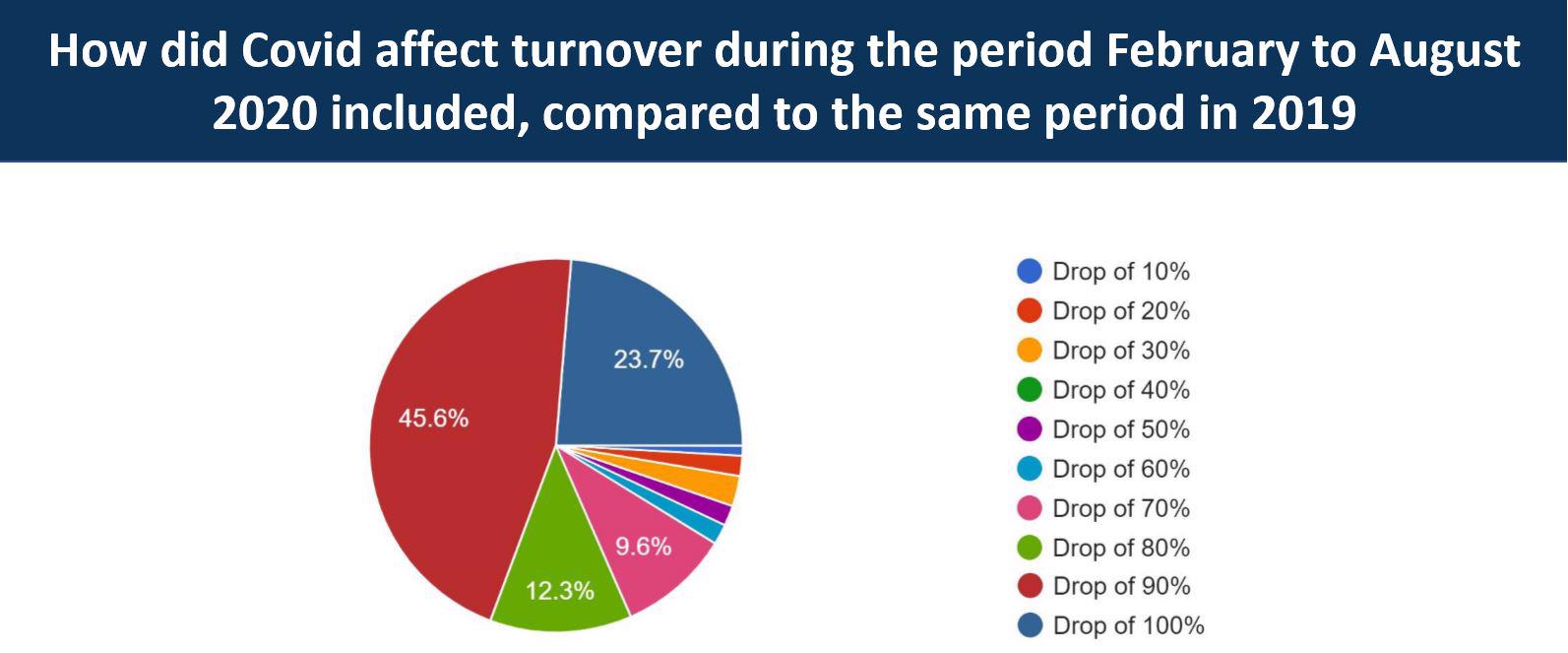Felca agent survey shows Covid impact & support for protection scheme
The Felca survey was distributed through its member national agency associations in August to their agencies and completed by 115 organisations, around a quarter of Felca’s collective membership. The results were presented during the annual Felca AGM ahead of the ST Alphe UK Online event last week.
Agencies were asked to compare the February-to-August 2020 period with the previous year, and the survey reveals that 81.6 per cent of respondents lost 80 per cent or more of business (see above graphic).
Some 23.7 per cent of agencies signalled a 100 per cent loss, while 45.6 per cent indicated a drop of 90 per cent, and a further 12.3 per cent experienced an 80 per cent decline.
Felca also asked agents about the measures they have taken to streamline and sustain business during the pandemic. Paolo Barilari , President of Felca, told StudyTravel Magazine, “It was very much a picture of reductions, lay-offs, working from home and cutting communication expenses to keep costs to the smallest amount.”
With multiple answers possible, 71.9 per cent of respondents said that they had started working from home or in a co-working space, while 63.2 per cent of agencies said that they had had to make some staff redundant.
Other common responses were: reduction of communications (50.9 per cent); partial or total standby of activities (47.4); and renegotiation of contracts with local suppliers (44.7).
Meanwhile, more than half of the respondents (52.6 per cent) said they had injected their own money into the company, 43.9 per cent have received funding from their government, and 42.1 per cent have taken a bank loan to sustain operations.
At least in the near future, Covid-19 has changed the way that agencies will work, Paolo said. “Agents have moved online, and 65 per cent believe they will move to a hybrid model of working in the office and from home in the near future, and 10.5 per cent believe they will work only online. However, a quarter of agents don’t want to change their model of office-based work.”
Felca is currently investigating the possibility of a global student fee protection scheme via a trust account, and the vast majority of respondents (89.5 per cent) said that such a move would be beneficial for the industry.
Paolo explained, “It would be a huge change for our industry. The idea is to have a trust account. It is difficult to achieve, but would be very welcomed as the survey shows. The positive thing with this would be that the school will know when a student has paid, but the agent would be able to get the money back in the unfortunate event of a school closure.”
There was also similar support (93 per cent) for the idea of a Felca-backed contract that could be used by schools and agencies worldwide. “A huge part of the respondents said ‘yes’ to this,” said Paolo. “This is another difficult target to be reached, but we are thinking about a contract that could be used worldwide, where each country adds some parts based on local laws.”
Paolo said that over many years the industry had been growing and that this was based on a large degree of trust, but that the Covid-19 pandemic had challenged that. “We need a system that protects schools and agents when trust is not enough,” he said.
The Felca survey was released alongside the annual Felca report, which shows business data and trends for the previous year. Explaining the reason for the additional Felca survey this year, Paolo said, “I was thinking that 2019 was a completely different picture and I wanted to have more of the situation right now, and get an idea from the Felca membership of how much has been lost.”
The Felca Annual Report for 2019 provides updates and/or data from 12 student markets, and shows the member agencies of the 10 national agency associations providing data collectively sent almost three-quarters of a million students overseas last year.
Growth was recorded in 2019 by the members of associations in Colombia (20 per cent), Spain (15), Taiwan (seven), Brazil (six) and France (two).
News Editor

